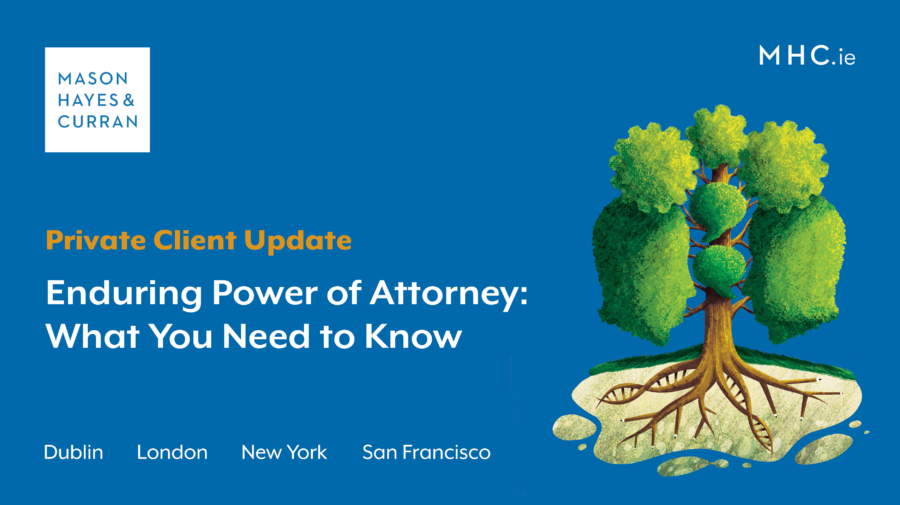Enduring Power of Attorney: What You Need to Know

Prepare for the worst and hope for the best - that is exactly what an Enduring Power of Attorney allows you to do. While you are perfectly healthy, you choose a trusted person who will act on your behalf if you become incapable of managing your own affairs. There have been substantial changes to the way an Enduring Power of Attorney is put in place since the new Assisted Decision-Making Act was made law last year. Our Private Client team explains the differences and why you should put one in place.
No one likes to think about losing capacity from stroke, dementia or a catastrophic accident. However, most of us would like some say over who would act on our behalf if the worst should happen. The purpose of an Enduring Power of Attorney (EPA) is to allow you to select those who will manage your personal care and your financial affairs if you ever become mentally incapacitated. From the perspective of those living in religious communities, it is generally understood that the local community will look after their members from a practical perspective. However, it is important to ensure that, from a legal perspective, you have appropriate arrangements in place to ensure that someone has the authority to make important decisions on your behalf.
The person, or persons, you choose is called an attorney, but they do not need to be a lawyer. The best choice is usually the person closest to you or who you trust the most. For many religious, the local community leader or superior is sometimes considered. You can provide that they make choices about your personal welfare, property, money, or all of your affairs. Alternatively, you can give your attorneys authority to do specific things for you.
An Enduring Power of Attorney must be made in writing and signed by you and your proposed attorneys at the same time and in front of two witnesses. It is important that you consider this before selecting your attorneys – if they live abroad, this requirement might be logistically complicated.
You can decide if your attorneys must act together or whether they can act alone when the other is not available for any reason. You are entitled to limit the scope of their decision-making in various ways.
Since the introduction of the Assisted Decision-Making (Capacity) Act 2015 (ADMA), the forms necessary to put an EPA in place are generated by the Decision Support Service (DSS), rather than being provided by your solicitor.
However, you will still need a solicitor to certify that you have the mental capacity to understand what you are doing at the time you put the EPA in place. Your solicitor also has to be satisfied that you are making an EPA by your own volition and not acting under the influence of another. Your GP will also need to certify that you have mental capacity to understand the consequences of making an EPA.
You must inform certain people about an EPA including your spouse, if you are married, and any adult children. If you are single and without children, you should tell your closest blood relative and some other person who cares about your welfare. These people are referred to as notice parties. Once they are formally notified of the EPA arrangement, they have five weeks to object on various grounds, such as a concern for your capacity or your choice of attorney.
Once complete, you need to register the EPA with the DSS. You are required to do this within three months of executing the documents – this is the stage where you and your attorneys sign it in front of two witnesses. Be mindful that the witnesses must be over 18 years of age and at least one of them must not be a family member of yours or the attorneys. In addition, they cannot be an employee or agent of the attorney.
Once approved by the DSS, the EPA lies dormant unless or until you lose capacity. At that point, it is the job of your attorneys to notify the DSS that you are no longer capable of making decisions about your own affairs.
You can cancel your registered EPA any time before it is brought into effect. This is called revoking the arrangement. You will need to cancel it in writing and before two witnesses. You can also change an EPA after it has been registered for over six months.
Comment
An Enduring Power of Attorney is more than just a document—it ensures that the people you trust can make decisions on your behalf if you are no longer able to do so. It is not only for the elderly; no one can foresee when a loss of capacity might occur. While you may never need to use it, having one in place means you are prepared for the unexpected.
For more information and expert advice, please contact a member of our Private Client team.
People also asked
How do I begin? |
You will need a MyGovID account in order to log into the Decision Support Service, which is the body which supervises Enduring Powers of Attorney. Many people already have a MyGovID if they have a public services card but if you don’t have one, you can set one up. Those who are not used to computers should ask someone to help them with this important first step. |
What do I do next? |
Once you are logged into the Decision Support Service portal, you can start creating your draft Enduring Power of Attorney document by putting in your personal details and then the details of your attorney or attorneys, your doctor, etc. |
What is an attorney? |
An attorney in the context of an EPA is not a lawyer. They are the person who will act on your behalf in making decisions about your personal welfare and your finances. It is important to choose someone who is familiar with your daily routine and your personal preferences. |
What is a notice party? |
You are required to notify at least two people that you are putting an Enduring Power of Attorney in place. |
Where can I get more information? |
Talk to your solicitor about the process or you can contact the Decision Support Service at queries@decisionsupportservice.ie or on 01 2119750 |
The content of this article is provided for information purposes only and does not constitute legal or other advice.
Share this:




